
 |
||||
|---|---|---|---|---|
| Volume 55 Number 2, February 1, 2025 | ARCHIVE | HOME | JBCENTRE | SUBSCRIBE |
Workers' Weekly Internet Edition: Article Index :
"New Hospital Programme"
Bankrupt Cartel Party System Refuses Essential Investment to Build and Repair HospitalsStudents Stand with Palestine:
Oxford University Students Occupy Radcliffe CameraPowerful Demonstrations:
Defiant Responses to State Attempts to Silence the People's Voices for Justice

On Wednesday, January 29, at Prime Minister Questions this week, the Prime Minister was bombarded with angry questions from MPs about the NHS hospital repair and building programme. This has been deferred by governments in many cases for at least 10 years with some not starting construction for 14 years.
The so-called "New Hospital Programme" (NHP) was set up in 2020, when Boris Johnson declared, to much scepticism and derision, that 40 new hospitals were to be built in England by 2030. The Programme was also intended to transform how NHS healthcare infrastructure was to be built, including by standardising hospital design; it was heralded as the biggest hospital building programme in a generation and a dramatic shift in the way major healthcare projects are delivered. At the time, NHS Trusts had an estimated £6.5bn backlog of maintenance to restore their estates to a standard fit for purpose, and this figure has obviously increased tremendously since then. By 2023, the National Audit Office (NAO) was reporting that the NHP was experiencing "delays", and that maybe 32 of the initial 40 would be delivered by 2030.
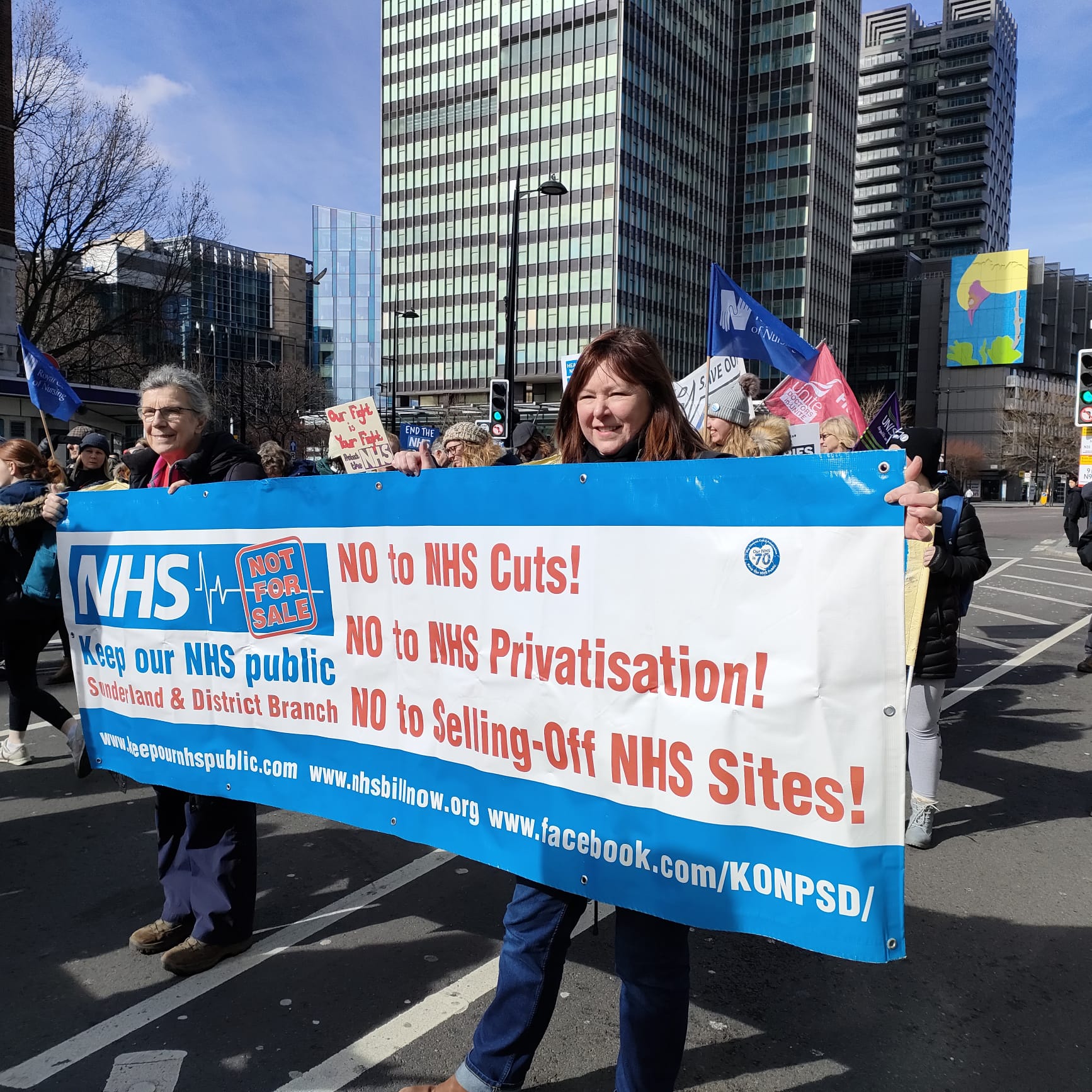
The present government has now confirmed that 18 hospitals will not begin construction until 2032 at the earliest under what is politely called a "revision" to the New Hospital Programme. To add insult to injury, the government has been spending more than £200 million on two private consultancy firms to review the previous government's hospital building plan that had failed to build, or fund beyond 2025, the 40 new hospitals it had promised during its term of office. The "New Hospital Programme: plan for implementation" [1] which was published on January 20 followed a review started when the Labour government took office and when they also put on hold existing hospital building programmes. Following the review by the private consultants, the NHP will now be subject to "5-year waves of investment. Delivery expectations may be subject to change depending on local and national factors and the programme reserves the right to adjust the delivery plan as schemes develop in the future."
Health Secretary Wes Streeting had the gall to say: "The New Hospital Programme we inherited was unfunded and undeliverable. Not a single new hospital was built in the past five years, and there was no credible funding plan to build forty in the next five years." That is to say, a clear need for essential investment in building and repairing hospitals, which the previous government recognised in words but completely denied in deeds, has been further kicked down the road by Starmer's government, under the hoax of balancing the books, denying the truth that it is a priority for a modern society to invest in health and social care. Rather than calling out the hypocrisy of the previous Conservative governments, Wes Streeting has become notorious for adopting the same rationale for refusing essential investment, and prioritising a privatising, pay-the-rich agenda and direction of the NHS.
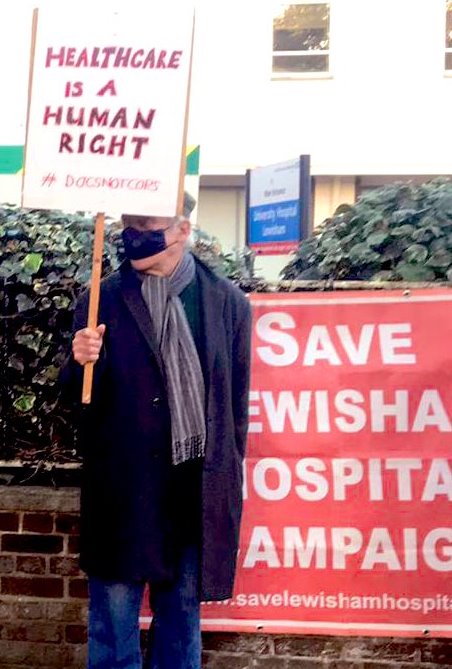
Amongst the reaction reported, for example, by Healthcare Management, Siva Anandaciva, director of policy, partnerships and events at The King's Fund, warned: "Pausing or delaying plans to rebuild hospitals is ... very likely to be a false economy - many hospitals are already spending significant amounts of taxpayers funding trying to maintain sub-standard buildings - and they will have to keep doing so in the years to come." Matthew Taylor, chief executive of the NHS Confederation, said it was "very disappointing" and urged the government to consider the "bigger picture on capital" ahead of the Spending Review this spring.
The Public Accounts Committee for its part issued a report [2] diverting the blame to NHSE "officials" for the state of sustainability of the "NHS's financial position" which "continues to worsen, with local NHS systems overspending by some £1.4 billion in 2023-24, more than double the previous year, due to rising demand, failure to invest in the estate, inflation, and workforce issues."
Thus is the anti-social argument of "overspending" by the NHS utilised to deny resolving the NHS crisis in favour of the people and their health. Such is the incoherence of government and the cartel party system. Such a bankrupt system cannot take responsibility for fully funding the NHS and providing it with investment in NHS estate and workforce resources that guarantees a modern health service for all and accessible to all.
Essential Investments Put on Hold

Hospitals that were in the process of being built such as Whipps Cross University Hospital, north-east London, have been put on hold. This new hospital is according to the NHP now in "wave 2" and expecting a "construction start date" of "2032-2034" leaving Whipps Cross with a new car park but no new hospital and no guarantee that it will be built even according to the new government's NHP 10-year timetable.
A statement on St Mary's, Charing Cross, Hammersmith and Western Eye London [3], some of which estate is 180 years old, states that "successive governments have kicked the can down the road for far too long, leaving us with the task of running a group of major hospitals that have not been maintained". Professor Tim Orchard, chief executive of Imperial College Healthcare NHS Trust, said: "This is devastating news for our communities, our staff and patients, and for the whole of the capital's healthcare system. We understand that the Government's New Hospital Programme must be affordable but the simple truth is that St Mary's Hospital, in particular, will not last until the 2040s. We run London's busiest major trauma centre and care for more than a million patients a year."
Fighting to Safeguard the Future of the NHS
Whilst for health workers and people in the communities this is indeed devastating news, it is made even more devastating because of the realisation that the Labour government will spend billions on escalating NATO's war in Ukraine, supporting Israel in its genocidal war against the Palestinians and funding the extra runway in Heathrow that the people of London have continued to oppose. Working people realise the importance of fully funding the NHS and investing in the welfare and health of the people. They recognise that they must put their energy into continuing to discuss and plan their own resistance to cuts to their health services and privatisation of its services that the Labour government is continuing, or will try to impose. At the same time they wish to have the decision-making power to shape the type of health care service that is needed to meet the needs of all and what the NHS should be: a modern health service that health staff and the public at large have been fighting for over many years in order to safeguard the future of the NHS and the right of all to health care.
Notes
1. New Hospital Programme: plan for implementation
https://www.gov.uk/government/publications/new-hospital-programme-review-outcome/new-hospital-programme-plan-for-implementation#waves-of-delivery
2. NHS financial sustainability, Public Accounts Committee
https://publications.parliament.uk/pa/cm5901/cmselect/cmpubacc/350/report.html
3. Statement in response to New Hospital Programme announcement, January 22
2025
https://www.imperial.nhs.uk/about-us/news/statement-in-response-to-nhp-announcement

On January 24, 2025, Oxford University students occupied the iconic Radcliffe Camera building, renaming it the "Khalida Jarrar Library" in honour of the Palestinian political leader and human rights advocate. Held to coincide with the International Day of Education, the action was aimed at holding the University accountable for its complicity in Israel's occupation and genocide [1].
The occupation was a direct response to the University's failure to meet the demands of organisers Oxford Action for Palestine (OA4P), who had organised encampments and other occupations on campus in the previous academic year [2]. These demands include an overhaul of investment policy, including that university-wide assets be disclosed and all arms companies and the university divest from companies complicit in Israeli genocide, apartheid, and occupation. The demands further call for boycotting institutional relations, and rebuilding and reinvesting in higher education in Gaza. The students demand that the University sever its relationship with Barclays Bank due to its investments in military technology used in Israeli military operations.
"Lockheed Martin, a key weapons supplier to Israel, uses components supplied by BAE Systems and Rolls-Royce to manufacture their deadly F-35 fighter jets - technologies developed in collaboration with Oxford University. These three arms giants, among others, have provided Oxford with tens of millions of pounds in research funding," OA4P points out.

On entering the library, the students vowed to remain in the building until the University agreed to meet all demands within a defined timeframe.
The occupation was accompanied by a series of events inside and outside the occupied library that afternoon, starting with a rally at Carfax Tower to mark the International Day of Education. That was followed by two teach-outs at the Clarendon steps, discussing Oxford's involvement in Gaza and the 2009 Clarendon Building Occupation. Students held a vigil alongside Oxford Health Workers for Palestine later that evening.
Two days later, OA4P and other local activist groups held a further candlelight vigil outside the library in memory of those who have lost their lives under Israeli occupation and to demand accountability for the ongoing human rights violations in Gaza and the West Bank.
Despite initial discussions with the activists, the University of Oxford ultimately called in the police to evict the students on January 25, leading to several arrests.
"The University deployed at least a hundred security and law enforcement personnel to forcefully arrest actionists and use physical violence on protestors outside the library, expending city and University resources in the process," report OA4P. "This follows the University's pattern of bad faith engagement with OA4P, and repeated violent repression of pro-Palestine organising on campus."
Despite this attempt at suppression, OA4P remains committed to exposing the University's ties to arms manufacturers and its involvement in Israel's human rights violations. "We will not rest while Palestine remains under Zionist occupation," declared OA4P.
Indeed, the students point out that the occupation of the Radcliffe Camera and the continued protests serve as a reminder that the fight for Palestinian liberation is far from over. With the University of Oxford under increasing pressure, OA4P affirm that the coming weeks will be pivotal in in the struggle for Palestinian rights and for their demands of Oxford University to be met.
As part of the ongoing campaign, OA4P has organised a mass picket of Barclays Bank on Saturday, February 8, 2025, from 11am to 1pm. The protest, under the banner of "Disinvest Now! Don't Bank on Apartheid", will continue the push for the University to sever ties with Barclays, whose investments in Israeli military technology are seen as enabling the occupation and the genocide.
Notes
1. Instagram posts from Oxford Action for Palestine, Oxford Health
Workers for Palestine, and Oxford Palestine Solidarity Campaign, January 24-26,
2024
2. "Oxford University Authorities Agree to Meet Encampment Students",
Workers' Weekly, June 8, 2024
https://www.rcpbml.org.uk/wwie-24/ww24-13/ww24-13-04.htm

January 18, London
The national demonstration in London on January 18 standing with Palestine, the day after the ceasefire deal had been reached in Gaza, was faced with aggressive police intimidation and arrests. The arrest of 77 demonstrators showed that it is the British state in conjunction with the most reactionary Zionism that is the source of intimidation and violence. It is the anti-war movement and those calling for justice in Palestine and an end to the genocide who take a principled stand who represent the sentiment of humanity.

January 18, London
Stop the War stated: "Our position on this is clear - it is nothing but a direct assault on freedom of assembly and democracy and an attempt by the State to close down protests on the question of Palestine." They added: "All charges against peaceful demonstrators must be dropped - immediately. We know that this repression of the right to peacefully protest will not end with us. In recent years, we have seen the establishment attack one group after another. From trade unionists on the railways to junior doctors, from Extinction Rebellion to Just Stop Oil, the government will go after anyone who campaigns for a change to the status quo."

Palestinians in Gaza celebrating the ceasefire
announcement
The Palestine Coalition, which includes Stop the War and the Palestine Solidarity Campaign, called an emergency public meeting on January 25, following the violent arrest of their chief steward Chris Nineham at the national Palestine protest, and the charges brought against Ben Jamal, director of the Palestine Solidarity Campaign. MPs Jeremy Corbyn and John McDonnell were also called in for police questioning. Dozens of prominent legal scholars have called for an independent inquiry into the Metropolitan Police actions during the protest. The intimidation of those standing with the justice of the Palestinian cause must end!
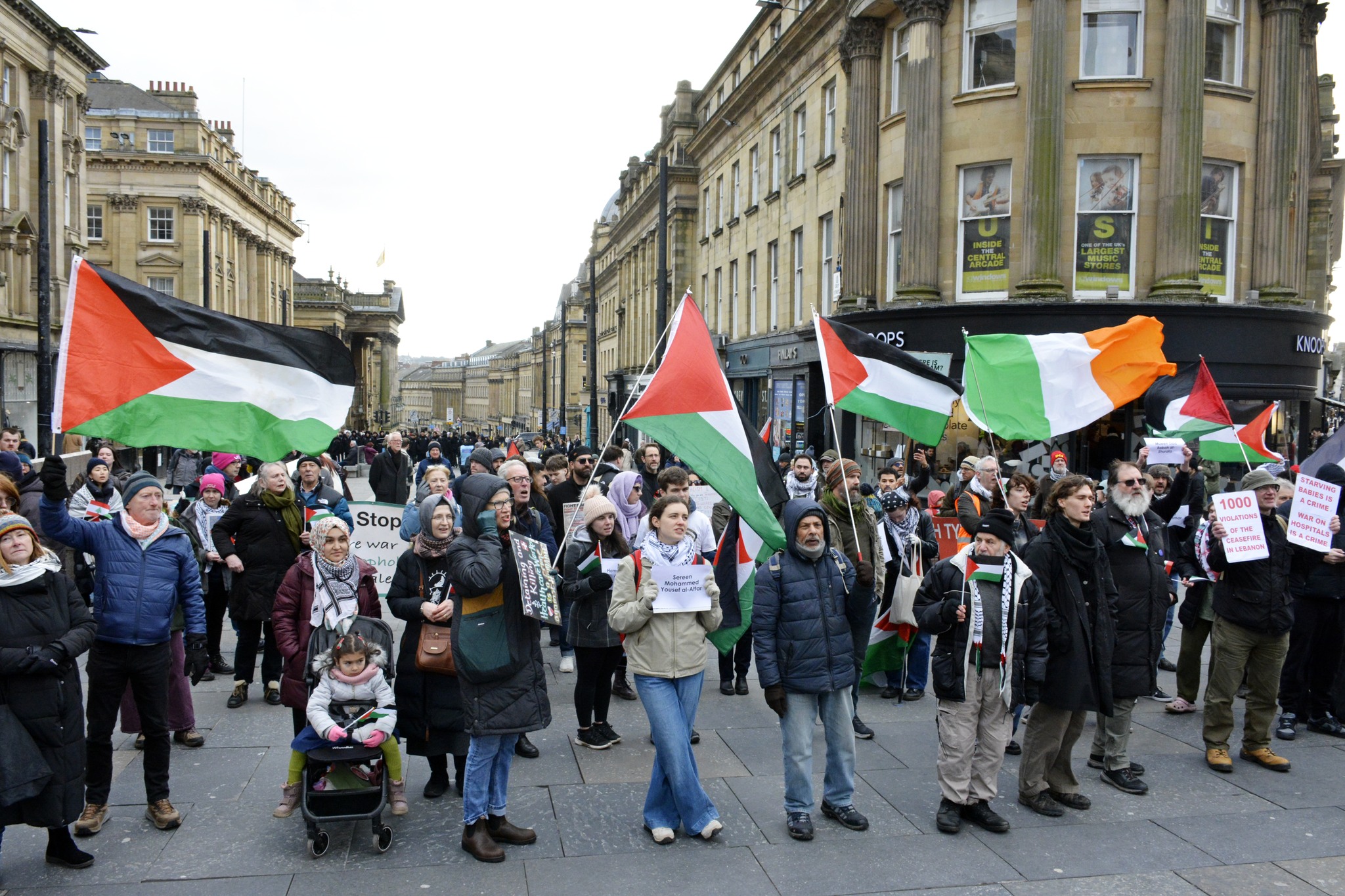
January 25, Newcastle
On Saturday, January 25, hundreds marched from Newcastle University Medical School to demand accountability for Israel's decimation of the entire health care system in Gaza. The march was organised by Newcastle Palestine Solidarity Campaign. At the Monument in the centre of Newcastle powerful speakers addressed a rally, and testimonials from doctors on the ground in Gaza were shared with the activists and members of the public. The speakers demanded the release of Dr Hussam Abu Safiya and the release of all medical hostages currently abducted and incarcerated by the Zionist entity. The message of the demonstration was that targeting the health care sector and medical personnel is a war crime!
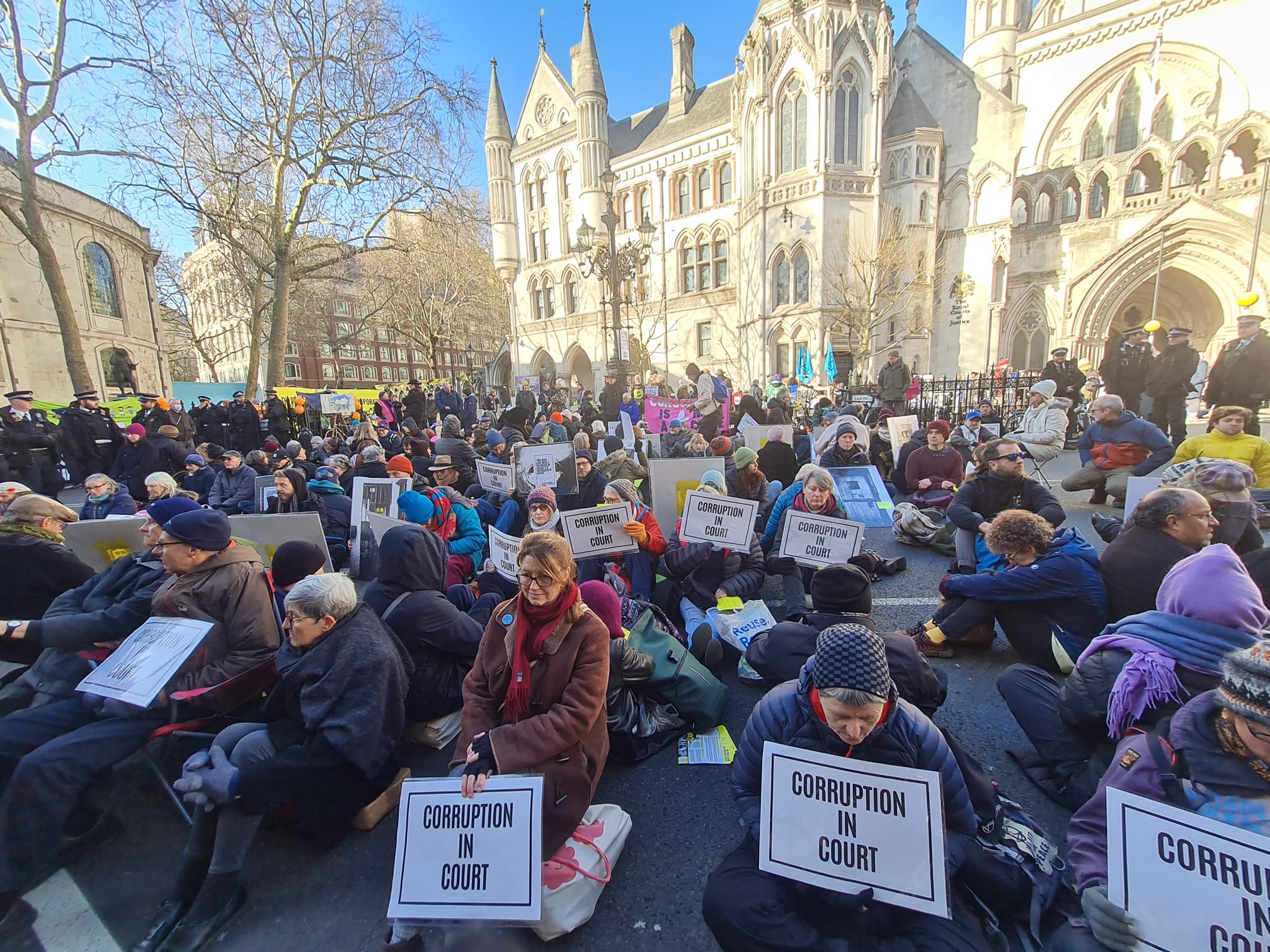
January 30, Royal Courts of Justice
There were powerful protests on January 30 outside the Royal Courts of Justice where 16 environmental activists are appealing prison sentences of years in length, which are purely punitive, and the longest of their kind in modern British history. At a rally outside the courts, there were also speeches in defence of activists against the manufacturers of arms in the UK used by Israel in Gaza. The activists have been imprisoned on remand for over a year now. Mothers of two of the activists spoke movingly and seriously in solidarity with their daughters and condemning the justice system.

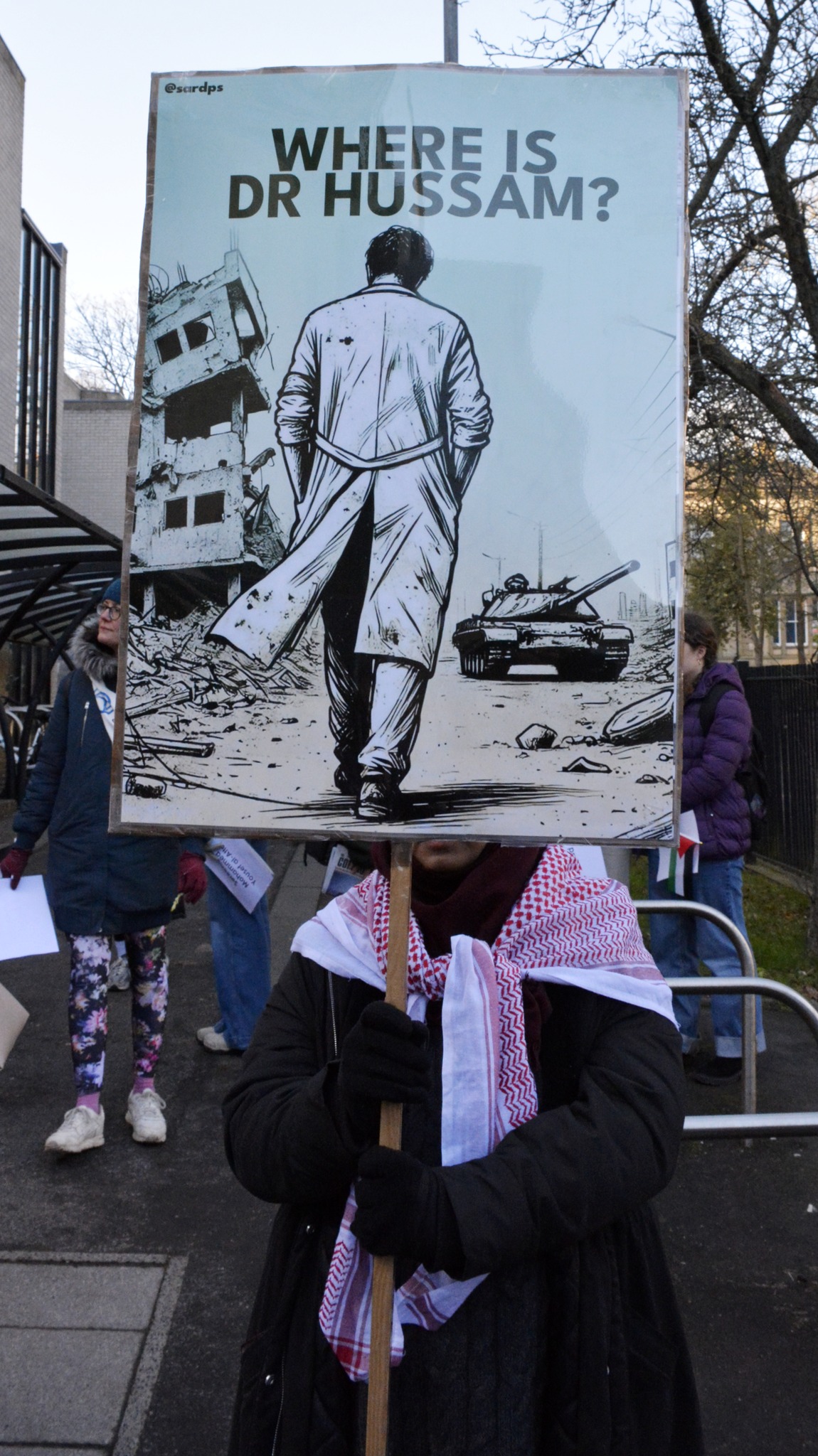


Receive Workers'
Weekly E-mail Edition: It
is free to subscribe to the e-mail edition
We encourage all those who support the work of RCPB(ML) to also support it
financially:
Donate to
RCPB(ML)
Workers' Weekly is the weekly on
line newspaper of the
Revolutionary Communist Party of Britain (Marxist-Leninist)
Website:
http://www.rcpbml.org.uk
E-mail:
office@rcpbml.org.uk
170, Wandsworth Road, London, SW8 2LA.
Phone: 020 7627 0599: